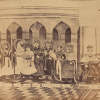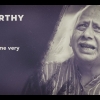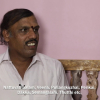Arun Mukhopadhyay is one of the most prominent theatre directors of Kolkata and the founder of the Chetana theatre group. Here he recounts the theatrical journey that is still on.
The Beginning
Debleena Tripathi: We can see from accounts of your childhood that there was the natmandir (a hall like structure associated to both worship and performance) at your old place at Howrah where kirtan asars (kirtan is a genre of religious songs from Bengal and asar refers to gatherings, especially for a performance) were organised—and you used to be a lead singer in such gatherings. How do you think this has influenced you later work in theatre?
Arun Mukhopadhyay: Not directly. The thing is, it gave me some confidence. At our home, we did not have much of an environment for theatre. There were a few shows, after the pujas. Our place was huge. Makeshift stages were erected in the lawn in front of the natmandir and plays were put up. But these did not have much of an impact on me. It is very difficult to say from where my longing for acting, my urge to become an actor began.
One thing I can say is that there were some amateur Yatra groups around my place. They use to put up Yatra shows regularly, though amateur. After managing their jobs and everything, just like we do in group theatres—they were exactly the same. There were a lot of well-read people there—educated and cultured people who felt an attraction towards the arts. Whatever little direct connection I had with them came much later. But the atmosphere they created was such. When they used to sing loudly in their rehearsals, the chorus songs, I could hear from my room. I am saying this because how the love for theatre, the urge to do theatre grows in a person is very uncertain, indeterminable. You cannot draw a definite trajectory, no. I am saying this because among my father and my uncles there were no notable actors. We had a huge family. Huge. A hundred or a hundred and fifty people living in the same premises. Even in that huge family, there was no practice of theatre—no actor or director who would influence me.
Musical performances were regular. I was not a lead singer to begin with. I used to sing in the chorus. I remember, though a little vaguely—one day the lead singer was sick, or he could not be present for some reason. By the time all the audience had arrived—most of them were women and aged. Religious feelings were dominant. So would there be no kirtan then? Someone pushed me, said, 'He would be able to sing. . . Won't you?' I don't remember what I said, but I participated. And I saw that of that whole show of forty-five minutes or an hour, I remembered all the lyrics of the parts the lead singer had to sing, and the tunes too. I did falter once or twice the first time.
But then, I used to perform as the lead singer often. The lead singer—even when he was not sick, when he got some work elsewhere—he used to say that there is someone to manage. This became regular. Music seeped inside me, but my voice was ruined. Genetically, my voice is a bit weak. My father's voice was weak too. My brothers too. Not everybody had the same voice though. There was too much pressure on this weak voice. This asar did not have microphones. In the huge Natmandir, you had to reach out to the audience with your bare voice—there was too much pressure on the voice for its own good. And for a considerable time. I came to know about this much later when I went to a specialist for voice problems. I used to have a sore throat often. So he asked me and he said it was there that my voice was permanently damaged. Since there had been no treatment for a very long time it was beyond recovery.
Influence of Cinema
Arun Mukhopadhyay: When I started acting...how exactly I started acting...another thing had a great role in this—cinema. By cinema, I mean commercial films—Hindi, Bengali everything. I was a movie buff. I used to run away from school! The number of films I have watched like this! These films must have inspired me, indirectly, very inconspicuously. These things are beyond cognition. You can only understand later. But the influence of films was there. I have prepared scripts imitating Bengali films after watching them and staged shows of the same at our Natmandir, quite a few times. Whatever I remembered from the film I used to put in the script and I always had the main role. I remember this because when I came back after watching Nader Nimai[1], the part that I remembered most was that of Sachi Mata. So I had to play Sachi Ma. These things were there. But exactly when all these culminated to the point where I (started thinking that I) could not live without theatre and theatre was all that I had. That was understood much later.
Ramyatra, the Vietnam War and Marich Sangbad
Arun Mukhopadhyay: The prime motive of writing Marich Sangbad was the Vietnam War. The idea was to write a play in the backdrop of what America was doing during the Vietnam War. The tussle between Marich and Ravana in the Puranas—I had that in my mind. But I did not have a clear idea about the headstrong and rebellious side of the character Marich. This reference of Ramyatra that I am going to tell you about—Ramyatra is all about improvisation. They (the Ramyatra party) used to come in the evening. They asked the locals for some light and nothing else—'Just give us the connection for a light. We will do everything on our own. . . we will sing.' And they used to do everything by themselves—it was a regular feature.
The Ramayana used to run for over a month. They used to improvise a lot. Strange improvisations too. Lal[2] was very young then. Lal was the first candidate. As soon as they could fit the light in the evening, he would go and sit there. So when I used to return from the rehearsals or from some other work, I had to call him from there, otherwise he wouldn't come. He had to be pulled away from there practically. Sometimes it would be over by 9 or 9:30 pm. Sometimes it would go on for longer. They also used to sell garlands: Rama's garland, Sita's garland, all these were auctioned. Yes, that was their income. Nobody paid them (to watch the show). Every day there would be something about Ram and Sita (in the show) and their garlands would be auctioned. They used to divide among themselves whatever they got from the auction. It would be a very meagre amount, very little. This was their passion too.
One day I had gone to fetch Lal and suddenly I heard. . . I did not see who was saying the words. . . I just heard, 'Am I a servant on Ravana's payroll?' I thought who is this, talking about being a servant on Ravana's payroll? I went there and I saw Marich and another person (acting). I asked 'Who is that?' Kalnemi had come. Kalnemi is Ravana’s maternal uncle. This Kalnemi has come to Marich as an ambassador of Ravana, saying, 'Come, you have to be the golden deer.' Marich is saying, 'No, I won’t go.' (Marich is) very adamant. Kalnemi tries to intimidate him. This thing about being a paid servant—Marich’s arrogance and Kalnemi’s intimidation attracted me a lot.
This is most probably absent in the Krittibas Ramayana. When I went and asked a few people they said yes, in the Adi Ramayana, the Valmiki Ramayana, Marich is like this—adamant. He is a devotee of Rama. He is not willing to transform to that (golden deer) to stand against Rama. So then I said I have got Marich then! If I get this story, it is a lot of help—because the story of Ishwar came last—the story of the lethel (a trained fighter with a rod [lathi] as a weapon)—in all the three stories there is an instance of intimidation and they refuse to bend down to that. The powerful is pressurising and these are the common people, who are by no means willing—they would fight on their own. This was the crux of Marich. The theme song of Marich was, 'Exploitation by intimidation is the tradition, you will be forced to submit'. This was the theme song of Marich. So I was writing this—had to write in a very little time, very fast. What was the pressure? Yes, the Coordination Committee—Marich was the first production of Chetana, but Marich was made before Chetana began.
That was for our Coordination Committee—I'll tell you about it later—we had to stage a play each year at the annual meeting of the Coordination Committee. And the leaders always wanted that I should write that play—a new play each time. Not one that has been done before. I have tried to write most of the times and this is where my—what should I say—author self developed and matured. That is a contribution of the Coordination Committee, and, in some part, of the IPTA too. They forced me to write. It is not that I liked writing a lot, but I somehow managed to prepare a script and then the production process used to be very serious there.
So that is how Marich happened. The professional artists who acted in the Folk Department of the government, the women from there used to join us in these annual plays of the Coordination Committee. That time I said that these artists would be on a tour and none of the women would be available. So they told me to write a play without women characters. This was the first thing about Marich—that there could not be any woman character!
Sangita Pal: So this was why Marich was written? This was the reason?
Arun Mukhopadhyay: Yes. This was a reason! So a play devoid of women. The idea of Marich, I had written a play before against the rule of Ayub Khan in Pakistan. The (character of the) Ostad (a highly skilled person; here, a magician ) was there. That is where the Ostad came from (in Marich Sangbad). It's like a net, you know! One thing is connected to the other in such a way, one cannot arrive at Marich suddenly! The format was there. The Ostad is putting up a show on the road—madari ka khel (Indian street show involving juggling, magic, rope walking, etc.)! He is performing the madari ka khel with his magic wand which is a piece of bone—he can call any person from any age, from any era. This format was prepared long before the writing of Marich. So now (the characters) are coming from different places—from the Puranas, from America—but (it reached) the people so easily—there was no question raised in anybody's mind—there was no hitch. It seemed completely normal, alright. And the primary narrative of the play, what happens to people when they are pressurised by the powerful and how the pressure is created—since that was the primary theme—it reached the people very easily.
Jagannath, Body Acting
Arun Mukhopadhyay: Then I gained much fame as an actor in Jagannath. That was primarily because of the body acting or physical acting—whatever you call it—body language. Even that is a mystery. I never knew that my body language is so strong. When I saw that I am not being able to execute what I want through my voice, the script of Jagannath changed completely. The script of Jagannath that was primarily written and the one that was finally performed were very different. Once it was decided that I will do the part of Jagannath, the script started changing.
(Jagannath had) a great number of dialogues. These were divided amongst others. And surprisingly that became the prime factor about Jagannath—the fact that all the cast members introduce the play in snippets for the first half an hour. At first all these (dialogues) belonged to Jagannath, when I first wrote it. He was the one introducing everybody. Once he would be introducing everyone and then again he would become a character himself. So once that was divided.
And about my acting, it was observed that I was more comfortable with body acting than I was about using my voice. And my body was responding the way I wanted it to. The mystery about this was that when I was young, I used to practice gymnastics for quite a few years, even performed in shows. This was when I was very young. So I had a strong background in muscle stretching et cetera. This was unknown to me. But I began from the unfamiliar and I was very good. Then everybody started asking me, 'Where have you taken dance lessons? Where have you studied mime?' None of that, I have never (studied). I did not get a chance to learn anything like that, under a teacher formally in regular classes.
Minimalist Theatre
Arun Mukhopadhyay: Really! The theatre of our country. Now after doing so much work in theatre I feel, and I feel this repeatedly, (that it is best to have) the minimum amount of technical complications on stage, minimum complications of light. Human factor: the actor, the audience and a space. I feel this all the time. I think a lot of other people think similarly too. She (referring to Sangita Pal) has started thinking in the same way after doing a few shows. It is so troublesome. . . There are so many factors out of control. And the money! Costs keep increasing. In theatre it is so difficult to. . .maybe it would be possible if the ticket price is five thousand bucks or more but practically that is not possible. Even if a show is houseful it is difficult to meet the expenses.
Debleena: It is impossible!
Arun Mukhopadhyay: Yes, impossible!
Rehearsals of the Coordination Committee
Arun Mukhopadhyay: In the coordination committee—just think about it—we used to rehearse for a minimum of four months (for each play). And what kind of rehearsals were they? There was no constraint of space—we had a huge space which we never used to have (elsewhere). We had that only much later, the chance to rehearse in a large space. So we had a large space and eighty per cent of the artists were from the Writers’ Building. Twenty per cent used to come from other places. And these twenty per cent who came from other places had a pact with their offices—they could come out at 4:30pm. You have to be there by 5:30pm or 5:35pm and the rehearsals would begin by 5:40pm.
I did Spartacus, Maa—there were fifty-sixty characters in each—not a single one used to be absent. Not a single one was absent! If someone was sick, it would be different. (But other than that) everybody would be present at 5:35pm. I mean, they were all at the Writers' Building anyway. They finished their job and climbed down the stairs, that's all! I have never had such convenient rehearsals anywhere else. And that is when I could carry out those experiments. Ample people. Maybe I could have managed with forty people elsewhere, but since there I had sixty, I used sixty. Using sixty people meant that the production would be more compact and more colourful. So I did.
The show of Maa that we did in Eden, in front of thirty or thirty-five thousand people, there were sixty cast members. . .sixty or seventy. . . in Maa. The good thing about doing these large scale productions is that, once you do these, it is easier to scale it down. Because, then, you already have experience. Till you do the large scale production your aim is that—you try that out. Once you have touched that, you can then think about making it tighter (concentrate on the finer details), etc.
Coordination Committee to Chetana
Sangita Pal: So you left Coordination Committee and made Chetana. Do you want to share the reasons for leaving the Coordination Committee?
Arun Mukhopadhyay: There was no reason to leave the coordination committee. At that time, during the Naxalite Movement, in (19)70 and (19)71, there were almost no cultural functions. The IPTA was stagnant. The coordination committee did not do many public shows anyway. I had a lot of time. I used to devote the time to the IPTA. At this time IPTA was almost doing nothing. I did not want to keep still. Then some of us from the Coordination Committee. . . There was no quarrel, no disagreement, nothing. . . A chunk of people from the coordination committee came together to do this. The group was created in a single meeting in one day. The President and the Secretary were also selected. In three more months we staged our first play. Can you imagine? We sat for the meeting on the November 22 and on January 15 we staged the show.
Sangita Pal: 22nd November is Chetana's birthday!
Arun Mukhopadhyay: Yes, Chetana's birthday. November 22, 1972. On January 15, 1973, Marich was staged.
Thik Theatre (Right Theatre)
Debleena: Here I would ask you something about the beginning of Chetana—in all the material that I could gather about Chetana, published in the first few years of the group, I have come across the term 'Thik Theatre' or 'Thik Natok' (Right Theatre) —
Arun Mukhopadhyay: Yes! Thik Theatre! The context of the term was that we needed to be clear about some things. Two classes. . . We believe that there are two classes. . . And you have to side with one of them. The ruling and the ruled. So we have taken this side, the side of the oppressed. So, Thik Theatre is that theatre. First you have to determine for whom you are speaking. That was a very clear thing. Right theatre! If we call it 'Good Theatre', we are not articulating the whole thing. That is why we need to bring in the word 'right'. 'Good Theatre' means that there is a good script, it has been enacted well. That's alright, but that is not where it ends. Even after that, (the question remains) where is it all going, all the effort of all these people—it has to be in the interest of one of these sides. So, if there are two sides, we take one. Very simple!
Poster Plays
Arun Mukhopadhyay: I have written a lot of poster plays! People do not know about it. I mean they have never been published and nobody has noticed them either. Not just one or two—I have written a lot of poster plays for the elections. She (Sangita Pal) has acted in the last poster play.
Sangita Pal: We have acted in the last three poster plays.
Arun Mukhopadhyay: Poster plays a different kind of fun!
Sangita Pal: Yes! They are great!
On Bertolt Brecht
Arun Mukhopadhyay: When the first few books of Brecht arrived at Kolkata, I do not remember exactly how one of them reached my hand. I was the first one to stage Brecht in West Bengal, though other people. . . It was a script by Soumitra Babu. . . Brecht has a play called The Exception and the Rule—which Nandikar staged under the name Bidhi o Byatikrom. Soumitra Babu's play was called something else[3]. I don't remember the name now. We staged the play at the Howrah Yuva Utsav. We had to stop the play for six or seven times due to catcalls.
Debleena: Why was that?
Arun Mukhopadhyay: People did not like it at all. It was terrible! We were not terrible, we tried our best! But anyway (it was interrupted) six or seven times. . . Kyablada of Shibpur IPTA. . . What's his name? He was a very accomplished person. He was announcing on the microphone, trying to control the audience. . . But it did not really work! It was a chaos!
I mean the first time we did Brecht, people did not understand anything. They did not get anything! It may be because we were not able to do it (properly)! Could be. . .
It was then that I translated Bhalomanush[4]—in (19)66. In '66, imagine! I translated it in '66 and I got the first chance to stage it only after Marich[5] became a popular production of Chetana and we got some money—I took the first opportunity to stage Bhalomanush. We did Bhalomanush in (19)74. It was lying around for eight years, since '66, translated and all. . . And again, I am working on it right now!
Sangita Pal: Haven't you done it twice?
Arun Mukhopadhyay: Yes. Yes, now look, the first time was a failure! Then again, in 19(80). . . '74 and then in '80, we did it again. A group productions in which they failed. . . These are. . . I shouldn't praise myself, but I have seen—there are a few things about me, my good sides! (laughs)
Sangita Pal: By this time, Nandikar's Bhalomanush was a huge hit!
Arun Mukhopadhyay: Yes, that was the first time. Yes!
Sangita Pal: So why do you think it (Bhalomanusher Pala) did not click? Any particular reason. . .?
Arun Mukhopadhyay: I think I overdid it—my perception of Brecht was possibly bookish. There was an attempt to do it in a Brechtian manner, but it was not successful. Ajitesh-babu[6] remodelled it completely. Bhalomanush was a good production, though they (Nandikar) did not stick to one primary demand of Brecht. Brecht had said that the fact that the same woman was dressing up as her brother should not be a big deal. People (should not) take it very dramatically. (But in this case) it was dramatic. This was what people liked. As a woman people were flocking around her for help—do this, do that, help us and all that—almost engulfing her in their need—and as soon as she comes as the brother, she puts everyone in their place—this became very dramatic. Now, these are Brecht’s words, but each country has their own way. At least about translation and Indianisation, Ajitesh-babu was brilliant. Be it Bhalomanush, Manjari Aamer Manjari, or. . . What was the other one?
Sangita Pal: Paap-punya?
Arun Mukhopadhyay: Yes, Paap-punya too.
Debleena: This is what I wanted to ask you. That the audience were not accepting Brecht’s plays to begin with, was it because they were not being emotionally engaged?
Arun Mukhopadhyay: Mainly that. . .
Failures with Brecht
Arun Mukhopadhyay: If we can flaunt our success, we can flaunt our failures too.
Sangita Pal: Failure in what sense? Is it because there has not been much audience?
Arun Mukhopadhyay: I say that, if you look at the result of a success and the result of a failure, you may find that the failure has yielded greater result. It can be. You are thinking that it is a failure, but some people might have assimilated a portion from it, which is priceless. Different people take it in different ways. My aim is that when I am doing a play, there is some philosophy behind it—am I being able to inject that philosophy in the audience? And about plays—Brecht has repeatedly said that it is not a school—the theatre is not a school, not a place to calculate in figures—this is a place of entertainment— of fun! ‘Fun’ is the word that he uses a thousand times. What does ‘fun’ mean? Amusement! This amusement should be intelligent!
Music in His Plays
Arun Mukhopadhyay: I understood later how the experience of the Natmandir had been important. I did not have to (run after) anyone to put our songs to tune. 'Some songs need to be made? That's fine! I will do it!' I have had this confidence from there (the Natmandir experiences). After a long time, going through a lot of things, that experience was thus assimilated. I have tried singing songs, I have learnt playing the harmonium on my own—but (I have never tried) singing in any function—what you would call singing formally. Sometimes when I am with four or five people—with my friends—I sing some songs, some songs from theatre, there are few which I sing. . .
Other people have contributed to my plays as music directors, not that they haven't—Murari RayChaudhuri (was the music director) in Putul Nacher Itikatha. But since I had a broad understanding of music, I could do things in my own way.
Music in His Plays: The Satire of Meri Baba
Arun Mukhopadhyay: The satire of the song of Meri Baba was that I had imported a chunk from Nader Nimai. Nader Nimai was a famous yatra pala from Howrah. There, when Neetai goes to convert Joagai and Madhai—the two brothers—drunkards—who were against Nimai. . .One of the two had more or less transformed but he is unable to convince the other. So this brother lifts up an earthen pot—a pot of tari (local liquor) and breaks it on Nitai's head—Nitai has a cut on his forehead—there comes that famous line—'You have struck me with the sharp edge of the urn; that does not mean that I will not give you love. . .' I brought this line directly, unchanged, to Meri Baba. And the tune was our traditional kirtana tune. When the next line appears in the same tune, the satire is automatically created. Just because of the tune, nothing else. 'You have struck me with the sharp edge of the urn; that does not mean that I will not give you love. . .' the next line (originally) was. . .
Sangita Pal: 'I will have it all later. . .' . . . No.
Arun Mukhopadhyay: 'O, give me your burden of sins and utter the name of Hari for once!' and I remember, when this was enacted, it would be just before dawn and everybody would chant 'Hari bol, Hari bol' and yawn. So I changed this line to 'O, I will have it all later, you still don't know Meri Baba' as soon as that was uttered, people would laugh—but why are they laughing? It is not just because of the lyrics. It is because (the lyrics have been put to) that tune. . . It is the tune of submission—it is a song of bhakti. The same thing when I tried to do in Hindi in Lucknow they were not laughing or anything—there was no reaction! Then I understood. There was a musician there and I discussed with him. He thought a lot and said 'Okay!' I told him to put it in the tune of a bhajan (a genre of devotional song) of Meerabai. I mean, the tune needs to be very well known. And once the bhajan was incorporated, the laughter started with the second line as usual. I mean that my music sense, is not just for the effect music of plays—the totally music sense—I have been able to use it more aptly then many people.
Music in His Plays: Formal Training
Arun Mukhopadhyay: Where ever I got a chance. . . I heard that Tarapada Lahiri would teach music. What music, why would I go to that class, I never knew. But I had a feeling that this would be of use somewhere. So I went. The people who used to learn regularly used to be astonished to see me, 'You here?' Or if somebody would recognise me they would ask, 'Why are you here?' I would say 'Just like that, I would just listen to this for a bit'. So I went there for a few days.
Then one day, I was going to the Youth Festival in Delhi, that was (an event of) the Law College. There are many stories of the Law College—interesting stories, I don't get into the details often. That apart—we were representing the Law College in the Delhi Youth Festival, each University could send one team. Calcutta University could send one team.
So that time, after a lot of selections and things, we were going. And Kishan Maharaj was there. Vandana Sen was going to dance—she used to be in Vidyasagar College or maybe somewhere else. Kishan Maharaj was going as a professional tabla player. So I was playing a beat to the singing in the train and Kishan Maharaj asked me, 'Do you play the tabla or what?' and I said, 'No, not really!' He said, 'I see that you have a good sense of rhythm! Do you want to learn how to play the tabla?' He gave me his address. Six months, I tied the cord, there is a ritual for that. You have to give something to the Guru. Especially you have to give a saree to the Guru's wife. . . this I remember! And some other things, as they guide, I give all that and tied the cord. For six months I was learning how to play tabla. This is the one thing in which I have taken formal lessons, where I had a Guru.
Music in His Plays: Roshan
Arun Mukhopadhyay: There was a scene in the play Roshan—on the eve of Independence— August 14, 1947. At night, there is a meeting going on—all the rich people are there—the labour officer, the local leaders. . . And there is Roshan. Roshan belongs to a very ‘low’ class—he is a labourer—he is serving alcohol and food et cetera—and in a distance there is an asar. Panna Qawal is singing Qawali—that song is drifting to this part. It had a tremendous effect. It was nothing much—these people would be acting as they were, the music would go on simultaneously, at times, the song would be louder. The audience could find a third meaning in the whole thing.
Debleena: Was there a reference to Netaji in this song?
Arun Mukhopadhyay: Yes, Netaji! Where has Netaji gone from Bengal? (sings) 'Where has Netaji gone from Bengal? I ask Gandhiji, I ask Patelji, I go and ask Jawaharlal. . .Where has Netaji gone from Bengal?'. . .This had a tremendous impact—and look at how little was said—there, a song is going on, someone is singing, here, some people are meeting—they are leaders, all upper class men, and where is Netaji here—it becomes a comment.
Sangita Pal: True, where was Netaji on the eve of Independence?
Arun Mukhopadhyay: This is a very effective use of music. When I conduct classes on (theatre) music—I repeatedly try to communicate this to the students—that the music is not meant to be an emotional aid for the actors—music serves a completely different purpos. It serves the purpose of the director. When the director has a comment to make. Suppose a person is dying—when the person is dying we are playing a very bright music—the director is commenting that death is good for you. Suppose when a tyrant is dying—death is painful to everyone—it is the same in the case of that person—but the director is commenting, that look, the death of this person is good for the whole community. That is why bright music is played. These are real uses of music in theatre—where you won’t be able to make that comment without using that music.
Political Comments in Jagannath and Roshan
Arun Mukhopadhyay: We have not been able to consider the masses in our (political ideology). This failure was there in both the plays, common. It was present in a certain way in Jagnanath and in another way in Roshan. As here (in Jagannath) Dheeman sacrifices his own life, true. There is no question about his honesty—but all the same, if your ideology does not apply to the masses then no revolution or movement can be tenable. This comment is there in both the plays.
Debleena: A lot of people must have spoken against this then?
Arun Mukhopadhyay: Yes, various points of view—without really understanding things. 'Why would Nanda and Jagannath fight like that? They belong to the same class.' I said that it is clearly given in Mao Tse Tung’s On Contradiction—there are antagonistic and non-antagonistic rivals. Nanda is non-antagonistic. Nanda says, doesn’t he, that there is one job and two people for it—there has to be a fight. Each will try to elbow out the other.
Actually, people who are solely into politics, devoid of the pleasures of art, are in big trouble. There might not be any questions about their honesty—but there are many questions otherwise—many questions.
How He Has Evolved as a Director
Arun Mukhopadhyay: The most important change—I don’t know if it has been for the good, but there definitely has been a change. To begin with, our local forms and folk traditions had a greater influence on my work. And as I started studying, I was introduced to Chekov, to Brecht. . . I am not much of a reader of Shakespeare—I have read his plays, but not as fondly. So my ideas changed and so did my production style. And I can’t say if that change has been for good—it is difficult to say that—very difficult. Because, the theatre that used to happen easily before. . .what had seeped in effortlessly from the childhood. . .in later times, all the reading and studying and watching new plays, knowing foreign plays, watching a few foreign productions—due to all these there have been some changes in my production style, especially on the technical side. Whether these changes have been for good—it is very difficult to say. . .
Theatre, Grants and Politics
Arun Mukhopadhyay: It is not true that theatre will stop if grants are withdrawn. But all the same, why should grants be withdrawn? Theatre deserves grant. I believe that theatre deserves grant. Yes, it has been misused. It has been misused because of faults in the total system. Because there is no proper infrastructure—I don’t think they want there to be any—they do not treat theatre with that much respect. It is like charity—'Let’s give them ten rupees!'—it is like that.
Debleena: And whenever someone is subsidising, they are expecting something in return—
Arun Mukhopadhyay: May be not directly, but then they see that they are getting it (implicit support/favour) even without asking.
Sangita Pal: True!
Arun Mukhopadhyay: Do you understand? They are getting what they want anyway—so they are happy—they don’t need to poke their nose. The people will fight themselves and die, that’s the spirit.
Sangita Pal: The relationship between politics and theatre that was there in your times—
Arun Mukhopadhyay: That has faded. . .
Sangita Pal: How would you look at this whole thing? This change. . .
Arun Mukhopadhyay: There are historical reasons for this—you have to look at the political history then! It has all faded now. . . No one had asked us to be responsible, no one forced us. . . But I felt myself that there is a connection—this (theatre) has a connection to the community. Just as the British maintained the Hindu-Muslim divide as a part of their divide and rule technique, they have also maintained the distance between villages and cities. And we have not been able to overcome it. You can see, Jagannath does not get a similar response in villages. I won’t count Jagannath—it is a much simpler play. Would you do Bhalomanusher Pala in villages? You won’t last ten minutes. Are the people to blame for this cultural difference? The policies are to blame. The British profited from this. And we have not been able to change this yet.
Sangita Pal: But when we go to the towns to perform we often get a good audience—
Arun Mukhopadhyay: Even if you consider Kolkata—what percentage of people in Kolkata watch theatre? If someone could really calculate and find out. . . Very few—so few that it is unthinkable. Not even ten per cent of the people to whom cinema reaches, commercial cinema. Ten per cent is an overstatement. Theatre belongs to such a minority, so it is very difficult for theatre to survive without subsidy. There are alternatives—alternative theatre, space theatre, intimate theatre, street theatre—but would you be satisfied doing only that? You would not be able to touch all parts of the art.
I have done it happily—I have worked in both proscenium and street—and I have worked in street theatre as the form demands—but that is a different point.
Debleena: The fact that so few people in Kolkata watch theatre—
Arun Mukhopadhyay: Yes, just look at the structure of Kolkata—so many kinds of people live here.
Debleena: But those who watch theatre belong mostly to a narrow socio-economic section. It is not at all widespread. How can we overcome this?
Arun Mukhopadhyay: I really don’t know. In our times, the political parties played an important role. They acted as a mediator. They felt responsible (to connect people to good theatre). 'Marich Sangbad? I will get them here—I will show this to the people!' And since Marich Sangbad was such a low budget play. It was for this reason that it had so many call shows. But this agent is no longer there, no one—no one who would support you—
Sangita Pal: No, the political parties still do organise festivals and things—
Arun Mukhopadhyay: That is different. There—the party itself, directly, and organisations of the party, such as the democratic writers’ and artists’ associations, other similar progressive associations used to play an indirect role. Now, they are doing it politically and purely politically. That is not done. Not done at all. Now they are backing groups who are close to them, irrespective of the quality of their play. Things are getting jumbled up like this—things are getting jumbled up.
But even in this situation some people are carefully putting out one leg to see if someone strikes or not. Actually, more than money or fame, theatre people are concerned about getting their art to people. They want people to watch, anyhow. So maybe they put up with injustices in some occasions, oil someone a bit, roam about as a sidekick of some powerful person. They are doing all these. And something is happening. What was once organisational has now come to a very small sphere. . .
Notes
[1] A slip – the film referred to is actually Sachimata Go
[2] Arun Mukhopadhyay’s son, Suman Mukhopadhyay
[3] Soumitra Chatterjee’s script was named ‘Bidhi o Byatikrom’. Rudraprasad Sengupta’s adaptation of the play, staged by Nandikar in 1981, was called ‘Byatikrom’
[4] Referring to Bhalomanusher Pala, adapted from Brecht’s A Good Woman of Szechwan
[5] Referring to Marich Sangbad
[6] Referring to Ajitesh Bandyopadhyay, the famous theatre personaity













